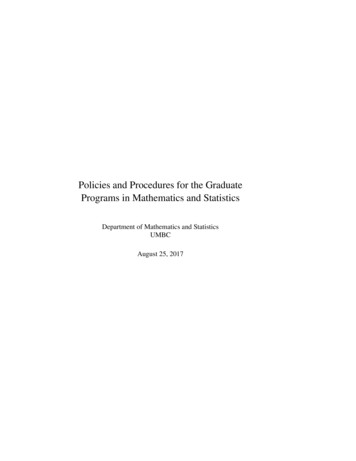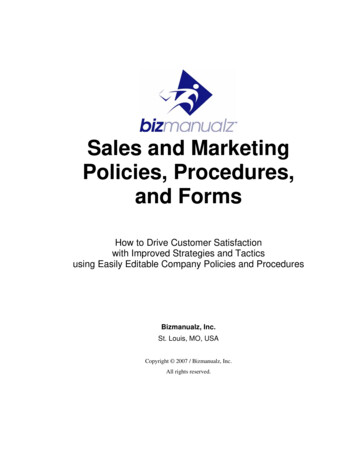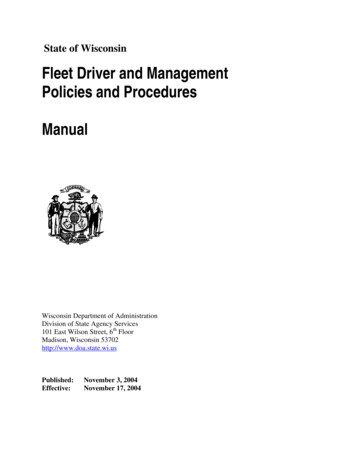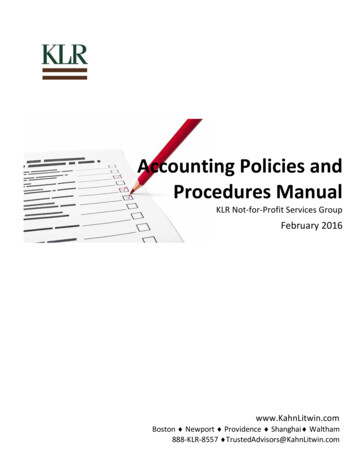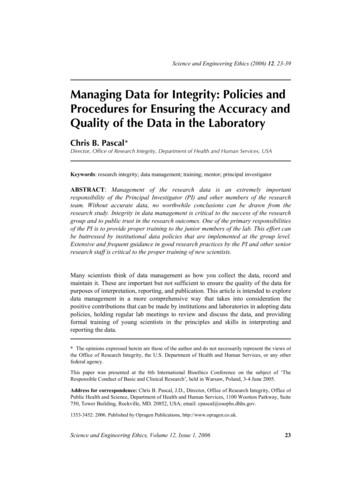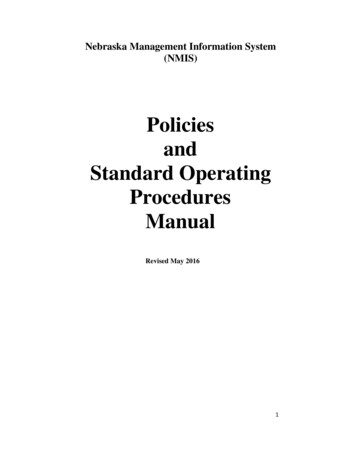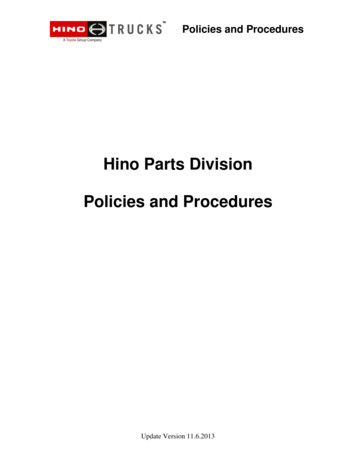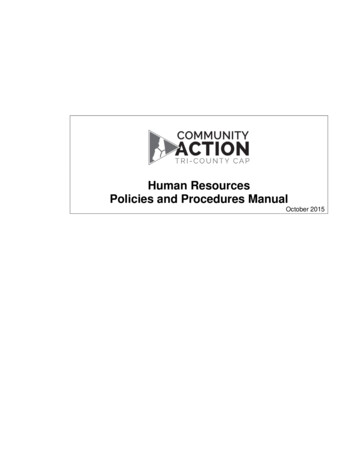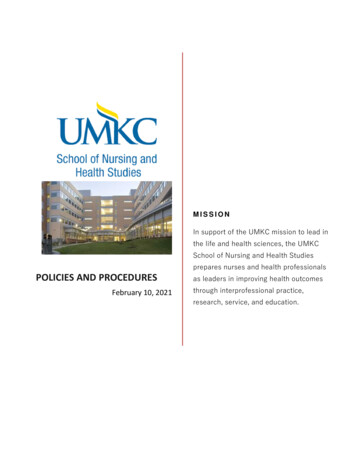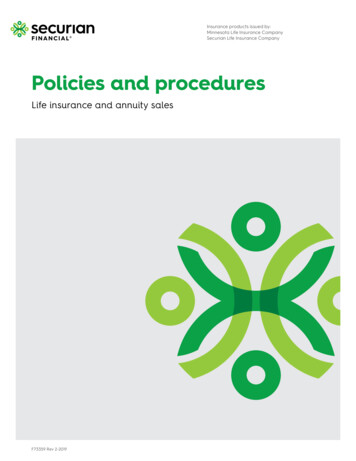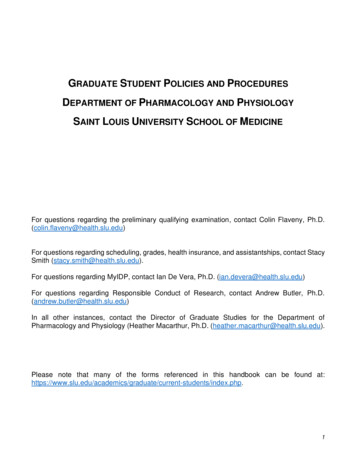
Transcription
GRADUATE STUDENT POLICIES AND PROCEDURESDEPARTMENT OF PHARMACOLOGY AND PHYSIOLOGYSAINT LOUIS UNIVERSITY SCHOOL OF MEDICINEFor questions regarding the preliminary qualifying examination, contact Colin Flaveny, Ph.D.(colin.flaveny@health.slu.edu)For questions regarding scheduling, grades, health insurance, and assistantships, contact StacySmith (stacy.smith@health.slu.edu).For questions regarding MyIDP, contact Ian De Vera, Ph.D. (ian.devera@health.slu.edu)For questions regarding Responsible Conduct of Research, contact Andrew Butler, Ph.D.(andrew.butler@health.slu.edu)In all other instances, contact the Director of Graduate Studies for the Department ofPharmacology and Physiology (Heather Macarthur, Ph.D. (heather.macarthur@health.slu.edu).Please note that many of the forms referenced in this handbook can be found students/index.php.1
TABLE OF CONTENTSChapterIntroductionObjective of the training programOverview of the training programFinancial commitmentSection 1. The core graduate program in biomedical sciencesSection 2. The doctoral program in pharmacology and physiologyEntry into the programGrading policyResponsible conduct of researchSection 3. Preliminary examinationFormation of preliminary committeeTimelineSection 4. Advancement to doctoral candidacy statusSection 5. Dissertation Committee and defense of doctoral dissertationFormation of doctoral committeeSection 6. Teaching ResponsibilitySection 7. Academic and behavioral standardsIndividual Development PlanRemediation and grounds for dismissalTerminal mastersDepartment sponsored travelSection 8. Summary of curriculum for M.D./Ph.D. studentsAppendicesA. Core curriculumB. Policies and procedures for graduate students and fellowsC. Process for students pursuing a Ph.D. at SLUD. Doctoral oral examination formE. Dissertation project, dissertation, and dissertation formattingF. Dissertation readiness formG. Academic integrity policyH. Dismissal 515151616-172
Introduction. This handbook provides a concise guide to the process and policies of the doctoralgraduate program of the Department of Pharmacology and Physiology of the Saint Louis UniversitySchool of Medicine. While specifically tailored to the department, the standards outlined here are guidedby the policies of the Graduate Program of Biomedical Sciences, the School of Medicine, and Saint LouisUniversity, which are the ultimate authorities in matters requiring remediation. Students should refer tothe documents obtained in the appendices for further information regarding University Policy. Theprogram is overseen by the Graduate Steering Committee which is composed of: Drs. Heather Macarthur(chair), Terrance Egan, Andrew Lechner, Gina Yosten, Colin Flaveny, and Jinsong Zhang, under thedirection of Chair of the Department, Daniela Salvemini.The Objective of the Training Program. The objective of the Saint Louis University Doctoral TrainingProgram in Pharmacology and Physiology is to provide individuals with the opportunity to achieve a highdegree of competence in the pharmacological and physiological sciences regardless of the student’sbackground, thus preparing them to pursue productive careers in academics and industry. The fivedefining goals of the program are to: (1) instill enthusiasm for discovery and the scientific process; (2)foster the development of critical thinking skills; (3) develop laboratory research competence; (4) developoral and written communication skills; and (5) promote a commitment to scholarship. This program isdesigned to provide students with a strong foundation in all aspects of basic biomedical science and thefreedom to explore diverse research opportunities.Overview of the Training Program. The program uses a multidisciplinary and integrative approach toprovide a strong foundation in basic biomedical science and the freedom to explore diverse researchopportunities (for curriculum, see Appendix A). During the first year of study, all traditional doctoralstudents enroll in the Core Graduate Program in Biomedical Sciences (see pages 4-6). Upon successfulcompletion of the first-year curriculum, students petition to enter the department under the guidance of achosen mentor. If accepted, these students complete formal training in pharmacology and physiology(see pages 6-9), successfully defend a preliminary qualifying examination (see pages 9-12) andundertake a research project leading to a doctoral dissertation(see pages 12-13). Students with advancedstanding enter the department as second year students (see page 6) and pursue an individualizedtraining program based on their previous experience and accomplishments that may include elements ofthe first-year curriculum. In the case of students with advanced standing, the dissertation research projectcannot include or consist of experiments conducted prior to admission into the Pharmacology andPhysiology doctoral program.Financial Commitment. Graduate Research Assistantships are subject to the rules outlined in thePolicies and Procedures Manual for Graduate Assistants and Fellows (link, or see Appendix B; see alsolink). Financial support for assistantships in Years 1 and 2 is provided and administered by the CoreGraduate Program in Biomedical Sciences. Financial support for assistantships in Years 3-5 isguaranteed by the Department of Pharmacology and Physiology. Financial support for assistantships forstudents who take longer than five years to complete their training is not guaranteed but will beconsidered on a case by case basis; in this instance, the dissertation mentor is the preferred fundingsource. In all cases and years, the dissertation mentor is the primary source of funding for laboratorysupplies and other expenses incurred during the course of the doctoral dissertation project.3
SECTION 1. CORE GRADUATE PROGRAM IN BIOMEDICAL SCIENCESOverview. The Core Graduate Program in Biomedical Sciences was established by the Departments ofBiochemistry and Molecular Biology, Molecular Microbiology and Immunology, Pathology, andPharmacology and Physiology. The program is directed by Dr. Willis K. Samson (Caroline Building Room207A; phone, 314-977-8678; email (willis.samson@health.slu.edu). The objectives of this program areto provide students with a broad foundation in basic biomedical science. At the same time, the programprovides a diverse range of research experiences designed to help students identify potential dissertationprojects. The one-year curriculum combines lectures, small groups discussion sessions, and seminars,and runs from August of the first year to July of the second year. The first-year curriculum consists of:BBSG-5010, 5020, 5030, 5040, 5110, 5920, and 5970; BCHM-6280; ORES-5200; and an online coursein ethics for research scientists (see pages 4-6).Basic Biomedical Sciences I & II (BBSG-5010, BBSG-5030). These are five-credit courses that meeton Monday, Tuesday, Wednesday, Thursday and Friday from 9:00 - 10:00 am. They are designed to giveall students a strong foundation in the basic biomedical sciences including biochemistry, cell biology,genetics, immunology, molecular biology, neurobiology, pathology, pharmacology and physiology. Thecourse is divided into 16 units representing 16 major topic areas in the biomedical sciences, taught byfaculty drawn from all biomedical graduate programs.BBSG-5010 Basic Biomedical Sciences I. Prerequisites: Admission into the common first-yearbiomedical sciences graduate program, or permission of the Course Director. Offered annually in the fallterm, this intensive, multi-disciplinary lecture course is taught by faculty from all four biomedical researchprograms of the Medical School. The lecture topics include: macromolecular structure, shape andinformation; DNA, RNA and protein synthesis; genetics and control of gene expression; membranes andintracellular organelles; pathways and control of carbohydrate metabolism, development andimmunology. BBSG-5020 is co-requisite.BBSG-5030 Basic Biomedical Sciences II. Prerequisites: Successful completion of BBSG-5010, orpermission of the Course Director. Offered annually in the spring term as a continuation of BBSG-5010,the course topics include cell biology, cell signaling, cancer, neurosciences, systems biology,endocrinology, metabolism, and virology. BBSG-5040 is co-requisite.Grading policy. Students are advised to consult the guidelines of the Graduate Program in BiomedicalSciences for a complete description of the grading policy (link). A short synopsis is presented here.Section Directors report the letter grade assigned to each student for that section, determined by theconsensus of all faculty who taught in the section. Graduate School descriptors are used to assign lettergrades. These descriptors are:A:A-:B :B:B-:C:F:outstanding comprehension of the material and/or ability to communicate that knowledgeexcellent comprehension of the material and/or ability to communicate that knowledge, somedeficiencies in expression of knowledgegood comprehension and acceptable communication knowledge baseadequate comprehension with some deficiencies in either knowledge base or communicationacceptable comprehension with deficiencies in either knowledge base or communicationminimally acceptable comprehension and communication abilitiesunacceptable demonstration of comprehension and/or communication of knowledge base4
“A”“A-”“B ”“B”“B -”“C”“F”4.03.73.33.02.72.00.0Course repeats are not allowed. In the event a student must withdraw for personal reasons, a decisionwill be made on a case-by-case basis whether to allow the student to re-enroll during the followingacademic year. The decision to allow a student to re-enroll does not guarantee financial support for thatenrollment.Students must maintain a cumulative GPA of minimally 3.0. Failure to earn at least a 3.0 GPA duringthe Fall Semester will result in the student being placed on academic probation for the SpringSemester, which may or may not result in loss of the student stipend. The cumulative GPA after Falland Spring Semesters must be 3.00. Students earning a GPA below that cut-off will be dismissedfrom the Program. If the GPA after the Fall Semester is so low that even a Spring GPA of 4.0 would notraise the cumulative GPA to above 3.00, the student will be dismissed after the Fall Semester.Appeals: Students wishing to appeal a given grade must notify the Director of Graduate Programs inthe Biomedical Sciences no later than three business days following posting of the grade(s). TheDirector will form an ad hoc committee of graduate faculty involved in the delivery of the course inquestion and at least one other graduate faculty member not involved in the course. They will reviewthe appeal and recommend a final decision to the Director, who will make the final decision.In the case of students wishing to pursue an additional level of appeal, the case will be taken to theAssociate Provost for Academic Affairs who will review the file to determine if the process was followed.The Associate Provost does not overturn a decision, but may send the case back to the college, school,or center if process was not followed.Special Topics in Biomedical Sciences (BBSG-5020, BBSG-5040). These are four-credit courses thatmeet on Tuesdays and Thursdays at 10:00 am - 12:00 pm. The objective of each course is to engagestudents in a variety of exercises designed to supplement and enhance the knowledge gained in the corequisite lecture course. The class is divided into discussion groups comprised of a few students and afaculty member. Although the format for each session can vary, extensive student participation inactivities such as problem solving, laboratory exercises, and discussion of primary literature is expected.BBSG-5020 Special Topics in Basic Biomedical Sciences I . Offered annually in the Fall term, thecourse involves participation in small group exercises involving problem solving and critical analysis ofthe current scientific literature. The special topics are selected to coordinate with the lecture topics in theco-requisite course BBSG-501.BBSG-5040 Special Topics in Basic Biomedical Sciences II. Offered annually in the Spring term, thecourse involves participation in small group exercises involving problem solving and critical analysis ofcurrent scientific literature in selected special topics, as related to the lecture topics in the co-requisitecourse BBSG-503.Ethics for Research Scientists (BBSG-5100). This course is a requirement for all pre- and postdoctoralfellows. This course consists of 14 modules that cover seven content areas (research misconduct, dataand management, responsible authorship, peer review, mentoring, conflicts of interest andcollaborations). After an introduction to each module, the student reviews additional material including5
case studies and completes a quiz. When all 14 modules are successfully completed, the web-basedprogram generates a certificate of completion. The Director of the Core Graduate Program (Dr. WillisSamson) collects copies of the certificates to ensure student compliance.Introduction to Basic Biomedical Research (BBSG-5970). This is a two-semester, two-credit courseconsisting of two six-seven, week rotations per semester. Students are expected to work Monday throughFriday for at least 20 hours per week. The primary objective is to expose students to researchopportunities across departments with the goal of identifying a dissertation mentor and research project.Students rotate through four different laboratories, in a minimum of two different graduate programs.Students are evaluated by their research mentors who submit a grade at the end of each rotation.Selection of a dissertation mentor occurs at the end of the Spring term after all rotations are complete.Research rotations in the summer prior to the beginning of their first Fall term at the University areavailable on a limited basis. An additional rotation is allowed in the unusual event that a student is unableto select a mentor after their initial round of rotations.Basic Biomedical Science Colloquium (BBSG-5920). This is a two-semester, one-credit coursemeeting one hour per week on Wednesdays at 12:00 pm. The goal is to teach effective methods of criticaldata analysis and formal scientific presentation, and to foster the spirit of scientific exchange.Fall Semester. Second-year Core students and postdoctoral fellows make 50-minute journal clubstyle research presentations (not of their own research) to provide good example of effective researchpresentations. Core Graduate Students are required to attend all sessions and participate in a special15-minute discussion at the end of each session. The final grade is based on participation in discussions.Spring Semester. First-year Core Students critically review and present a paper from the currentscientific literature. Further, they are required to attend all student colloquia. The final grade is based onpresentation quality, as evaluated by attending faculty, and on participation in the discussion sessions.Introduction to Statistics (ORES-5200). This is a one-semester, three-credit course given in theSummer semester. It surveys of most appropriate statistical tests for the analysis of bench researchbased data sets. Both parametric (including correlations, tests of robustness. Power analysis, andmultifactorial analysis) and non-parametric tests will be demonstrated with real data sets submitted bybiomedical researchers in the School of Medicine.Bioinformatics (BCHM-6280). This is a 2-credit, 1 semester course offered every summer. The courseintroduces students to the use of publicly available databases and tools to support bioinformaticsanalyses of high-throughput experiments. The major goals of the course are to understand how nextgeneration sequencing technologies are used in biomedical research; learn how to use publiclyavailable databases/websites to find specific information about gene lists; learn how to analyze genelists to form hypotheses that can be tested experimentally and use that information to practice writingresults as they would be formatted for a research manuscript.SECTION 2. THE DOCTORAL PROGRAM IN PHARMACOLOGY AND PHYSIOLOGYEntry into the Program. The Department of Pharmacology and Physiology admits traditional, nontraditional, and M.D./Ph.D. students. In all cases, the requirements for entry are: (1) selection of adissertation research advisor from amongst the Pharmacology and Physiology faculty (see belowconcerning faculty with secondary appointments); (2) written acknowledgement by the student andadvisor of the expectations and responsibilities required by the Department of Pharmacology andPhysiology (see page 6); and (3) written permission of the Chair (Daniela Salvemini, Ph.D.). Additional6
requirements for each group are:Traditional Students. Traditional doctoral students are admitted to the department after successfullycompleting the Fall and Spring Semesters in the Core Graduate Program in Biomedical Sciences with agrade point average of “B” or better (3.0 on a 4-point scale) in the Core Curriculum.Non-traditional Students. Non-traditional students enter the program at the discretion of the GraduateSteering Committee and the Chair of the department. They must have completed an advanced degree(Master or Doctoral) in a relevant discipline, while maintaining a GPA of “B” or better.M.D./Ph.D. Students. M.D./Ph.D. students enter the program at the discretion of the Chair of thedepartment after successful completion of the first two years of the medical school curriculum.Overview of the Program. The following description describes the program followed by traditionalstudents entering through the Core Program. M.D./Ph.D. (see pages 16-17) students follow modifiedschedules. Depending upon their qualifications, non-traditional students may follow a modified curriculumapproved by the Graduate Committee, otherwise they will follow the program outlined below.After successfully completing the one-year Core Graduate Program in Biomedical Sciencescurriculum, students in good standing (GPA of 3.0 or above) may elect to complete their Ph.D. studies inthe Graduate Program in Pharmacology and Physiology. Students who enter the doctoral program takean additional six credit hours in advanced coursework (PPY-5110, -5120, -5130 and -5140), and attendweekly seminar (PPY-6800) and journal club (PPY-6900) presentations. After completing the requiredcoursework, the students assemble a Preliminary Proposal Defense Committee, write their PreliminaryExamination Proposal, and defend it before the end of February of their second year in the department(see pages 10-12).At the same time, students begin research on their dissertation project under the direction of theirfaculty advisor. After successfully defending their preliminary examination, students select a DissertationCommittee who oversees their research efforts until graduation (see pages 12-13). Students are requiredto meet with their dissertation committee at least twice per year. Continued participation in weeklydepartmental Journal Club and Seminars is also required, as is participation as teachers in theundergraduate course Drugs We Use and Abuse (BLA-2930) (see page 13); students who are verifiedto graduate in the upcoming semester are not required to register for PPY-6800 or PPY-6900. Studentsare expected to complete their dissertation work, including the oral defense of the written document, bythe end of their fifth year (fourth year in Pharmacology and Physiology). Students must present a publicseminar on their work upon successful defense of their dissertation.Introduction to Pharmacology (PPY-5110) This is a five week, one-credit course that meets duringAugust-September of the Fall semester. Its two-hour lecture blocks cover the topics of: binding theory;concepts of ligand effi
1 GRADUATE STUDENT POLICIES AND PROCEDURES DEPARTMENT OF PHARMACOLOGY AND PHYSIOLOGY SAINT LOUIS UNIVERSITY SCHOOL OF MEDICINE For questions regarding the preliminary qualifying examination, contact Colin Flaveny, Ph.D. (colin.flaveny@health.slu.edu) For questions regarding scheduling, gr
